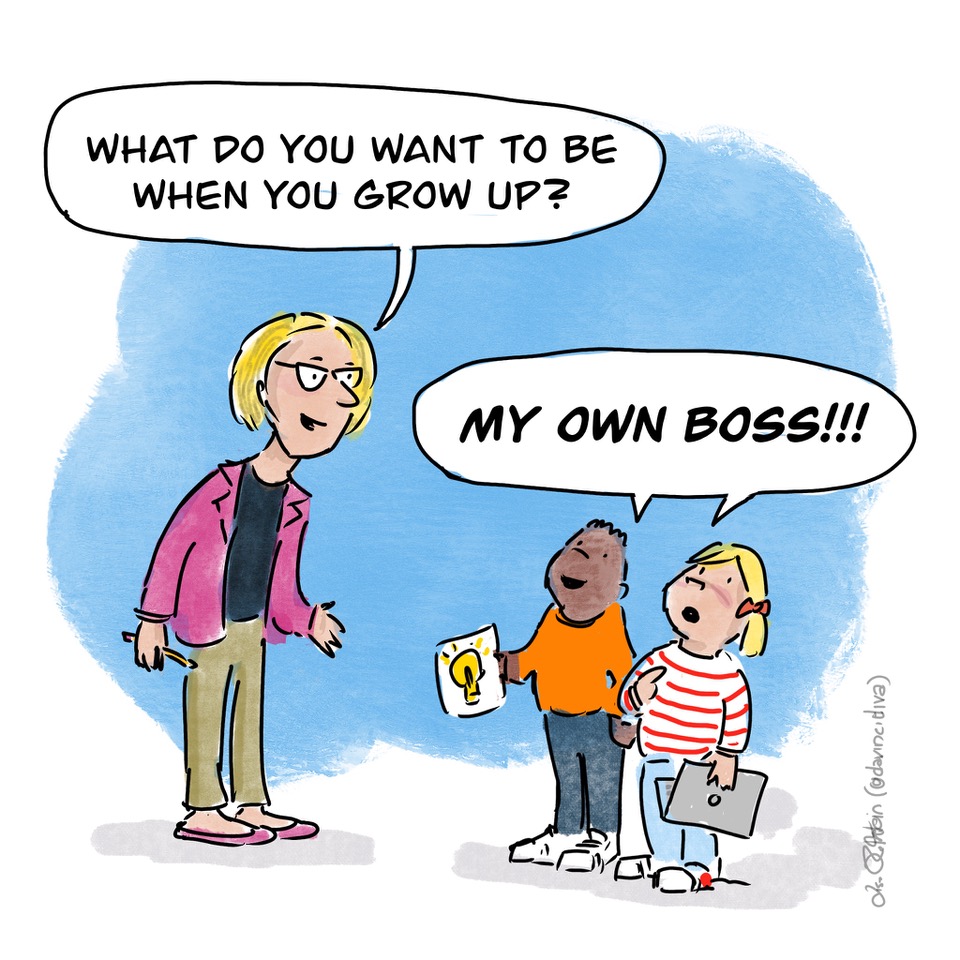If freelancing has a caped crusader, it’s Kim Kavin.

By day, Kavin is an award-winning writer and editor. She’s been a professional freelancer since 2003, and an ASJA member for about as long.
But in her alter ego, Kavin is a prominent proponent of freelance writers’ rights to self-employment. One could argue that at this moment, Kavin is the most high-profile freelance advocate in the country. The work she started five years ago to help stop her home state of New Jersey from passing anti-freelance bills snowballed into cofounding Fight for Freelancers USA with three other ASJA members. In 2021, ASJA awarded Fight for Freelancers’ cofounders an exceptional service award for the nonpartisan coalition’s work standing up for freelancers’ rights.
Kavin’s advocacy work led her to testify before Congress in 2023 against proposed federal regulations that would misclassify legitimate independent contractors, including writers. Shortly after Trump was elected to a second term, she was nominated for a panel advising the incoming administration’s Labor Department on freelance issues; the announcement of those appointments is pending.
Kavin is writing a book about freelance busting and is in post-production as a writer-director on her first short film. I caught up with her recently to find out more about her freelance business, how she became an advocate, and what her advice is for writers who want to protect their livelihoods. The interview has been edited for length and clarity.
How did you start freelancing?
I graduated from the University of Missouri-Columbia School of Journalism in 1994. I spent about a decade moving from staff jobs at daily newspapers into monthly magazines, and at the magazines, I realized some of the freelancers were earning more than I was. They also had better lives, free from the 9-to-5 grind and office politics and glass ceilings and all that jazz.
So, I placed a bet on myself, quit my job, and launched my freelance career in 2003. That turned out to be one of the best bets of my whole life.
What’s your specialty?
I typically write about three things: boats, dogs, and franchises.
The boats, I learned about when I was executive editor at Yachting. A lot of boating magazines have staff and freelancers who know everything there is to know about boats, but they need help with reporting, writing, and editing. That’s my bread and butter in terms of how I pay the mortgage. My regular clients include many of the biggest recreational-marine magazines in the country, covering kayaks straight on up to superyachts. I cover trade and industry news, too.
Dogs are my personal passion. I’ve written a couple books about dogs in addition to many stories for publications like The Washington Post. A big Sunday page one story I did for the Post won ASJA’s Donald Robinson Prize for Investigative Journalism in 2019. It documented how nonprofit rescues and shelters were using donated dollars to buy up dogs and puppies from the same breeders they slammed as “puppy mills.”
Franchising I write about regularly for Entrepreneur. I got into that title when somebody gave my name to the editor in chief, who was looking for a writer to create the brand’s first-ever advocacy journalism series. It was a campaign in opposition to the Protecting the Right to Organize (PRO) Act. I knew a lot about that federal bill from having been a co-founder of Fight For Freelancers. Regulatory language in the PRO Act threatens the livelihoods of freelancers and franchise owners alike.
What prompted you to co-found Fight for Freelancers?

In 2019, ASJA’s network alerted us all to problems in California with a new law called Assembly Bill 5 (AB5). The law had regulatory language that redefined who could legally earn income as a freelancer. The language—which the politicians said would “protect” freelancers by turning them into traditional employees that they didn’t even want to be—was actually causing clients to drop freelancers left and right. The clients were terrified of being fined by the state if they kept hiring the freelancers they’d worked with for years, and they had no reason to bring them on as employees. So the business relationships just went kaput after that law was enacted.
California’s nonpartisan analyst office said at the time it would probably affect about a million people, and not all in a good way. Economic analysis now shows that AB5 was a total disaster. It decreased self-employment by 10.5%, decreased overall employment by 4.4%, and didn’t result in any discernible growth in traditional employment.
But in 2019, all we had was anecdotal evidence of the problem. The freelancers in California were sounding the alarm quite loudly when my home state of New Jersey announced that it was going to try and pass a copycat bill. That did not sound good, so I got together with other freelancers in New Jersey to try and stop the copycat bill from going into law here.
None of us had ever done advocacy work like that, but it turned out that we were good at it. We learned how to write op-eds and press releases. I ended up on TV arguing with a state senator in our statehouse. We ultimately stopped that New Jersey bill from becoming law. Then we went on to help stop the PRO Act from passing in Congress. In 2023, I testified on Capitol Hill about the need for lawmakers to stop attacking the freedom to choose self-employment. After that, we sued the Biden administration Department of Labor over its new independent contractor rule. In October, a federal judge dismissed the case with prejudice, agreeing with the defendants that the suit lacked standing; that ruling is being appealed. To find out more about what could happen next, read this post on my Freelance Busting Substack. (ASJA cosigned a letter from the Institute for the American Worker urging Congress to rescind the DOL rule but was not a party to the suit.)
Our message has remained the same: we have a right to be our own bosses. Stop trying to take away that right.
How did your Labor Department policy advisor nomination happen?
I’ve been working on this policy problem for five years, so I’ve gotten to know a lot of people—association presidents in all kinds of professions, lobbyists, attorneys at top law firms, and various members of Congress and their chiefs of staff.
The incoming Trump administration wants some “real people” in government roles. A person with the Trump transition team asked a person from the trucking industry for the name of someone who might be a good real person, and the trucking industry person gave them my name.
The next morning, I woke up, went down to my kitchen to make breakfast, and was standing there in my pajamas, checking messages on my phone. And there it was: I was being nominated to serve. I looked down at my dog and said, “Wait, what just happened?”
I texted my congressman and he immediately texted me back to say he would support me. I sent an email to a high-up GOP staffer on Capitol Hill, and he replied immediately that it was great news. I asked a couple lawyers at top firms, and they said don’t worry, we’ve got your back. Everything just snowballed from there.
If you’re chosen, what role would you play?
My hope is to make sure there is a serious voice representing independent contractors at all the policymaking tables where we have been excluded for far too long—in the White House, Congress, everywhere. We have a right to hang out a shingle and go into business for ourselves, and the government needs to stop trying to restrict that right.
Even if I am not chosen, I believe that the Republicans are going to use their big election victory to help us. I know that statement may not sit well with ASJA members who lean liberal. But in this policy area, the Republicans have introduced legislation and joint resolutions on our behalf. They have held congressional hearings to amplify our voices. They have issued subpoenas and demanded answers for us. They are some of our best champions on this issue, and now, they are in a position to get things done.
For the record, this is not a campaign ad. I’m not a Republican.
What can self-employed writers do to protect their business?
As soon as the government changes over in January, call your lawmakers and tell them you want them to prioritize the protection of independent contractors.
One of the biggest reasons our livelihoods are being threatened is because lawmakers don’t understand who we are. They think freelancing isn’t a serious career. They believe our opponents who claim that freelancing isn’t “a good job.”
Our opponents are wrong, and we are the ones who have to make that case for ourselves. I can show them all the statistics and data in the world, but unless lawmakers get to know us as people, the message is hard to deliver.
If you feel uneducated or afraid to talk to your lawmakers—who are supposed to be working for you—join the Fight For Freelancers Facebook group and start learning about this policy issue. Follow me on X @thekimkavin. Get a free subscription to my Substack, “Freelance Busting.” Go to a town hall where your lawmaker is speaking and listen. Get comfortable with the idea of being an active participant in democracy.
We need a much bigger cavalry to show up and add their voices when opportunities arise to pass a bill or get a regulation put in place. If you can develop a relationship with your lawmakers before those key moments happen, then you will be in a much better position to call them when we need them, and you will be taken more seriously as an engaged constituent and voter.
That’s what we can all do together to protect our business model for the future.
How has ASJA supported your freelance business?
My interactions with ASJA are always evolving. As a new member, I was trying to figure out how to freelance. Then, I was trying to figure out how to get my income to six figures a year. After that, I was trying to become an expert in contracts so I could negotiate better terms. It seems as if no matter what I am trying to learn, ASJA has some kind of a seminar, article, or something to help me.
And, of course, the friendships. We’re all friendly competitors here. We lift one another up in truly wonderful ways.
What’s your advice for ASJA members to prepare for the future of the business?
What we’re fighting for on all this policymaking stuff is to make sure there is a future for freelancing as a business model. That’s not hyperbole. Our opponents’ goal is to restrict our business model or to make it outright extinct.
I have always voted, but I rarely did anything else. What I’ve learned these past five years is that I was giving up a lot of power by failing to engage more fully. Lawmakers are people. I’m on a first-name basis with many of them now. They just have to get to know us. We’re worth fighting for. Knowing us makes them want to fight even harder for us.

